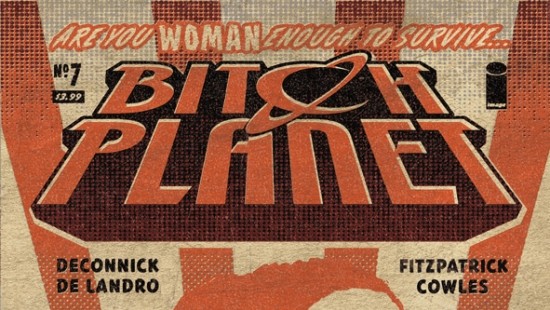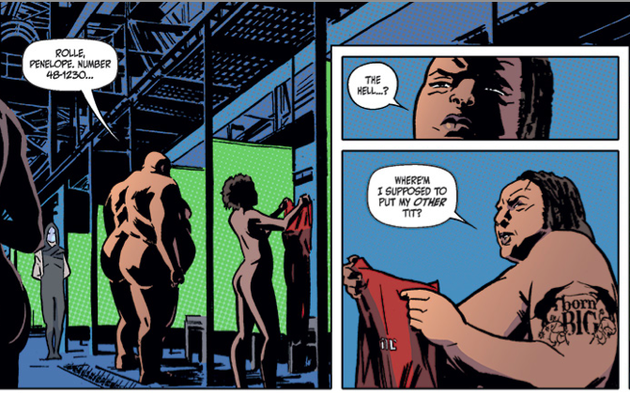This was written by Nathan Alley for Big Shiny Robot! You can reach him at nathanjalley@gmail.com

SCRIPT BY: Kelly Sue DeConnick
ART/COVERS BY: Valentine De Landro, Robert Wilson IV, Taki Soma
COLORS BY: Cris Peter, Kelly Fitzpatrick
LETTERS BY: Clayton Cowles
COVER & LOGO DESIGN BY: Rian Hughes
BACKMATTER DESIGN BY: Laurenn McCubbin
“Bitch Planet” isn’t just meaningful and poetic, it’s also super fucking badass.
The sixth issue of “Bitch Planet” begins with a metaphor comparing a woman’s body to that of a violin. In one page, it reflects on the structure, beauty, and strength of a thing that sums up (almost) everything you need to know about that issue’s main character, Meiko Maki. It makes a point of mentioning the “soul post” that supports the structure of the instrument and keeps it from collapsing under pressure. After you experience her tragic origin, the book ends with a return to the violin metaphor, this time on a defiant note that makes you realize that all those elements are just individual parts of a fully-realized woman of considerable complexity and “soul”.
If that sounds boring to you, you probably don’t deserve to know how wild and action-packed this dystopian sci-fi romp actually is. Because “Bitch Planet” isn’t just meaningful and poetic, it’s also super fucking badass.
“Bitch Planet” takes place in a not-too-distant future where society has taken a turn into an absolute and unquestionable patriarchy. The world is run by the “Fathers”, a group of gross old men who know better than you and appear on everyone’s mandatory television feed, controlling and judging the populace. Though I should clarify that society as a whole seems pretty complicit in this take on the patriarchy, not just the ones pulling the strings. Generally, these men like their women thin, polite and obedient. If a woman steps outside of that box in any way, she may be found “Non-Compliant” and whisked away to their off-world prison planet, the “Auxiliary Compliance Outpost”, otherwise known as “Bitch Planet”. There, they face pervy guards, a corrupt warden, and a terrifying female A.I. called “The Catholic”, who appears in nun headgear, a corset and booty shorts as she bullies them into confession.
this is an unabashedly feminist piece of literature
If you haven’t figured it out by now, this is an unabashedly feminist piece of literature. If that word scares you, you may need to be reading more in general, but this wouldn’t be a bad place to start. The description above may sound pretty far-fetched, but we live in a world where controlling women’s bodies is one of the most debated (yelled) about political issues. “Bitch Planet” is the place Donald Trump wants to send women for getting abortions. That’s real; that’s happening RIGHT NOW. In an essay in the back of the first issue, Danielle Henderson writes: “The striking thing about “Bitch Planet” is that we’re already on it.”
Thematically, this book has a lot of layers. When it really gets going, it has this powerful, rebellious spirit that’s hard not to get wrapped up in. At times, it’s sad and infuriating, at others, it has a wicked sense of humor. It delves into a plethora of topics, including racism, gender roles, sexual assault, body-shaming, power, corruption, violence, entertainment, and family. But the through line that makes it all work is Kelly Sue DeConnick’s sense of empathy. Empathy for the characters and empathy for those that share their experiences.
In this writer’s opinion, DeConnick, who is not just one of the preeminent female writers in comics, but one of the best writers around, period, has created her magnum opus. “Bitch Planet” isn’t just a masterpiece because it’s thoughtful and ambitious; it’s also a well-oiled machine. I mean, this book is lean. Every page either tells you something you need to know about a character and their themes or moves on with the plot. More than that, it takes the tropes of a much-maligned genre (the women-in-prison exploitation film) and does fresh and exciting things with them. I’m surely not the first to make this comparison, but the work DeConnick and artist Valentine De Landro have done here reminds me of how Quentin Tarantino takes elements of genres he loves and makes them his own in a way that feels confident and game-changing. By subverting something that has always been sexist and morally problematic, this book’s creative team have constructed something that is wholly original.
It’s not just movies that are being subverted in “Bitch Planet”, though. In your mind you might already have an idea of what these characters are going to look or sound like, but I can almost guarantee that you would be wrong. That’s because everyone in this book has multiple layers to their character. There’s no straight-up “tough bitch with a machine gun and an extra Y chromosome” without showing what’s actually going on behind her eyes. The protagonist, Kamau Kogo, is in many ways the “strong black woman” archetype, but she has empathy, wit, and cunning plans that are slowly unfolding.

There’s always been a problem with the way women are portrayed in comics. To say that it’s not getting better would be disingenuous, but they’ve got a long way to go. Several things have moved the needle in the right direction, among them, more female voices on the creative side of things, and an influx of female readers. It would also be inaccurate to not point out that there have always been female comic book readers, but the new world that has come with digital comics has made them more accessible to those hesitant to enter a space that’s not always female-friendly. Any girl (or boy) with a phone, no matter where they live, has a comic book store at their fingertips. There’s a whole other debate to be had about how this hurts the brick-and-mortar stores but, seriously, read that last sentence and tell me that this isn’t an incredible time to be a comic book nerd.
De Landro is doing the best work of his career.
More importantly, if this art form that we love is going to survive, it’s going to need to become more inclusive. It’s great that “The Avengers” made an obscene amount of money at the box office, but it’s not exactly bumping up the sales of creator-owned work along with it. To do that, the comic book industry has to create content for everyone, not just 15-30 year-old white males. And there’s a large portion of readers who will read what I just wrote and immediately reject it as someone encroaching on something that they love that (in their mind) doesn’t need changing. I get that sense of ownership over comics, I really do. But comics limited by what we’ve always done, hurts the whole industry, just like how the patriarchy hurts everyone, even men. Feminism isn’t about attacking men; it’s about fighting for balance and equality. There’s an interesting bit in the letters page of one issue where a man asks DeConnick for her blessing to get a tattoo of the “Non-Compliant” mark given to the prisoners of Bitch Planet. He wonders if it’s in bad taste for him to identify himself with this thing that has become a symbol for female readers who relate to the themes of the book. She responds, “Feminism is for EVERYONE. A man identifying as a “feminist” is not at all the same thing as co-opting the experience of oppression. And frankly, if men are not invested in fixing this problem, it ain’t gonna get fixed.”
The point is, you don’t have to be shipped off to prison to be judged. If you’ve ever been called too fat, too skinny, too loud, too quiet, too dark, too feminine, too masculine, too slutty, too uptight, too (insert derisive label here), you can identify with the concept of “Non-Compliant”. Even if you don’t personally feel oppressed, I find it hard to believe it’s possible to read this book and not shudder at the naked honesty of what women go through on a daily basis.
In issue #3, the character of Penny Rolle (how great is that name?) is shamed about her weight by the authorities. In the world of Bitch Planet, being overweight can be a crime, and Penny herself has been charged with “wanton obesity”. One of the Fathers interrogating her remarks: “Good GOD, woman. What have you done to yourself?” Faced with the choice of accepting their “help” to change her appearance or sticking to what she believes is her ideal self, she laughs in their wrinkly, mansplaining faces. That’s no easy feat in a world where the latest diet trend is a gastrointestinal parasite and advertisements are plastered everywhere that say: “EAT LESS, POOP MORE”, “LESS OF YOU TO LOVE” and “BUY THIS IT WILL FIX YOU”. This is satire, but let’s be honest, these are not inaccurate depictions of the insane weight loss expectations women face in the real world.
I’m running out of space and I haven’t even mentioned the absolutely incredible art team, De Landro in particular, who is doing the best work of his career. Every page is filled with complexity and detail, even in panels that efficiently and cleverly use negative space. His realistic depiction of women in all sizes, shapes, and colors gives a stylized world weight and authenticity. Wait until you see the “Obligatory Shower Scene” that puts a clever twist on the reader-implicit male gaze. Or the explosive title pages that hook the reader at the beginning of every issue. I’ve barely touched on the fight scenes that pop right off the page. Or the back cover of every issue, a page of meticulously detailed farce advertising that’s funny as hell (and I suspect fun to create).
Also worth mentioning is maybe the best backmatter I’ve ever found at the end of a comic book. It’s got a lot of the things you’d expect: a letters page, cosplay photos, fan art, tattoos, a message from the author. But in addition to all that, every issue has an essay from a different guest about feminism or a topic related to the themes of the book. I can’t stress enough how essential these essays are to the experience of reading “Bitch Planet.” They add another level of notability to the series and for me, made rereading it much more rewarding. And they are only printed in the individual issues, you poor trade-waiting bastards.
Penny Rolle is the best name for a character since Furiosa
But why IS this book so important? Because the women in it are three-dimensional, honest, and flawed human beings. Because it’s inspiring readers to be honest with themselves about who they are. Because it’s opening the comic book industry to new audiences. Because it’s a discussion that’s not being had in a lot of genre storytelling. Because they still haven’t even made a great female-led comic book movie and they won’t until you show them who’s actually reading. Because Penny Rolle is the best name for a character since Furiosa. Because Gamergaters are going to haaaate this thing. Because it does what any great science-fiction does by holding up a mirror to our society.
I love this book and it makes me proud of this community that “Bitch Planet” is a comic. One that is a wholly original thing in any media and that is developing such a beautiful response and following. It’s a story that surely takes courage to write, to draw and to publish, and to all of those involved, you have my sincerest thanks. Seriously, if you consider yourself a comic book fan, a feminist, or both and you aren’t reading this, get it together.
The only question is, are you woman enough to survive… BITCH PLANET?